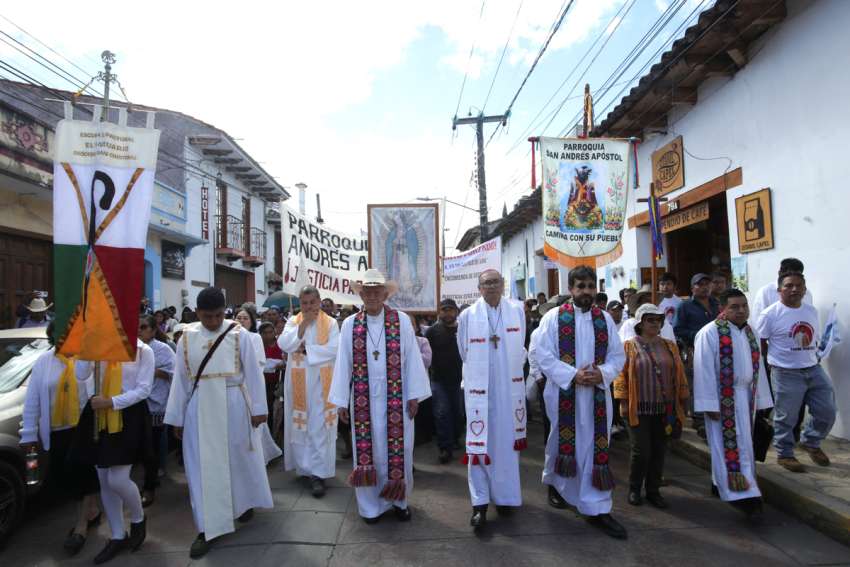Auxiliary Bishop Francisco Javier Acero Pérez of Mexico City urged the truce, saying in a Dec. 5 address forum for Catholic leaders at the Universidad Panamericana, "We can show the world that through Our Lady of Guadalupe and through this deep belief of people, we can achieve a truce for peace, we can all stop hostile communication and also lay down our weapons for a day. And from that day on, we can see how we can begin to live in peace in our country."
Bishop Acero continued, "These are exactly days when we need to reflect so that from then on we can have a 2025 full of brotherhood and peace, and show the world how we are united and also how we help each other so that all types of violence cease in all actors of society."
The Mexican bishops' conference joined the call for a truce and requested the intercession of Our Lady of Guadalupe and Niño Jesús -- Child Jesus -- for Mexico's many victims of violence, including the families who search for their missing kin, migrants and "those living in vulnerable situations."
"In a country where violence has left painful scars on families and polarization among social actors, this proposal invites us to reflect and act in favor of reconciliation, respect and human dignity," the bishops' Dec. 9 statement said.
"May these days of faith and devotion serve to demonstrate that peace is not only possible, but necessary."
Mexicans celebrate their patroness every Dec. 12 with pilgrimages around the country. More than 12 million pilgrims are expected to arrive in the days leading up to the celebrations at the Basilica of Our Lady of Guadalupe in northern Mexico City -- the world's most visited Marian shrine and the site where Mary appeared before St. Juan Diego in 1531. Devotion to the Virgin is deep in Mexico. And many Mexicans -- even non-Catholics -- call themselves "Guadalupanos."
The 2024 feast day comes amid uncertainty in Mexico. President-elect Donald Trump has threatened to impose crippling economic sanctions on the country's exports and promised to deport millions of migrants in the U.S. illegally -- including many Mexicans, who headed north to escape poverty and violence.
Peace has also proved elusive in Mexico, where a crackdown on drug cartels over the past 18 years has claimed hundreds of thousands of lives and left more than 100,000 missing.
Mexico's political leaders have squabbled over outlining a security strategy and sticking to it. President Claudia Sheinbaum and her predecessor and mentor, President Andrés Manuel López Obrador, continue to blame violence on a 2006 decision by a fierce political opponent, then-President Felipe Calderón, to directly confront drug cartels with military force.
López Obrador campaigned in 2018 on the slogan "hugs, not bullets," in which the state didn't directly confront criminal groups, though the strategy was poorly defined and the homicide rate stayed stubbornly high. Sheinbaum has stated a preference for using intelligence and cooperation between police and soldiers -- something security analysts say will lead to more confrontations.
Violence has increasingly struck the Catholic Church. Mexico, meanwhile, remains one of the most murderous countries for Catholic clergy.
At least 10 priests were murdered during the 2018 to 2024 presidency of López Obrador, according to a report from the Catholic Multimedia Center, which tracks violence against the church.
The center's 2024 annual report found another 10 priests and religious had been victims of violence; approximately 900 extortion attempts and death threats were made against the members of the Catholic Church; and two priests remain missing since 2012. At least 26 churches were robbed, attacked or profaned.
Indigenous Father Marcelo Pérez was murdered in October after celebrating Mass in southern Chiapas state. He endured death threats for his work accompanying victims of violence and confronting powerful non-state actors in communities rife with violence.
"His murder was not circumstantial, nor 'collateral damage,'" the report said. "It reflected that his pastoral action and activity in favor of human rights was uncomfortable for those who cut short his existence."
The center's director, Pauline Father Omar Sotelo, told the media Dec. 9 that priests often play a stabilizing role in their communities. Their work in favor of the downtrodden and the willingness of some to speak prophetically in the face of human rights abuses is seen by criminal groups "as a certain competition," he said.


